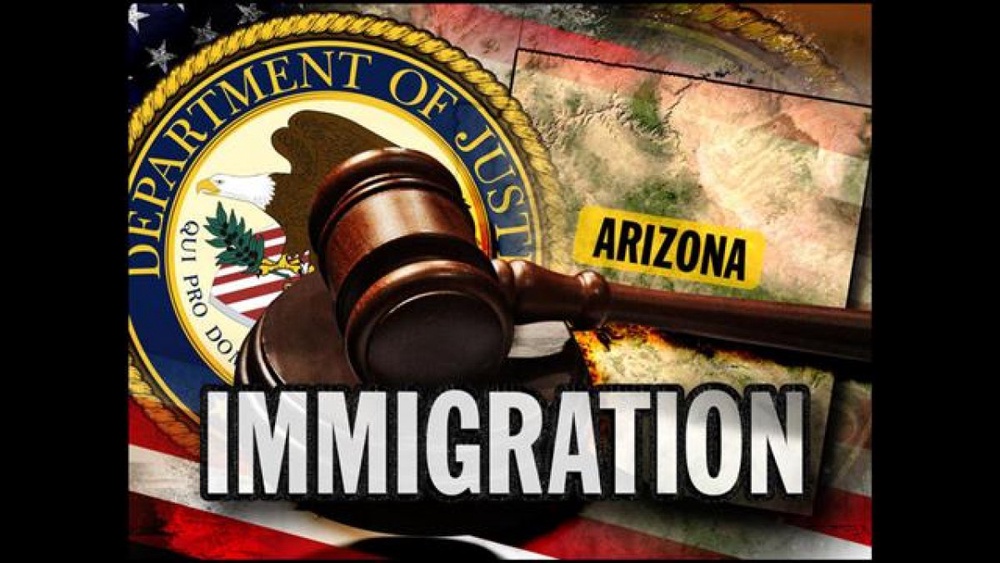
Police in Arizona can now start asking crime suspects about their immigration status, as a contested law that raised fears of profiling of Hispanics took effect in a state bordering Mexico, AFP reports. The clause of what is known as the "show me your papers" law kicked in Tuesday after a US District Court judge upheld the most controversial part of a 2010 law. About a third of Arizona's 6.6 million residents were not born in the United States. There are an estimated 460,000 illegal immigrants in the state. "With SB 1070 in effect, state and local officers will be empowered to inquire about an individual's immigration status, but only as part of a legal stop or detention and when the officer has reasonable suspicion," Governor Jan Brewer said in a statement Tuesday. SB 1070 is the name of the overall law. "I've never claimed that SB 1070 would cure Arizona's problems with illegal immigration," she added. "What SB 1070 does represent is one more tool that our officers can use in collaborating with federal authorities to reduce the crime and other impacts associated with illegal immigration in our communities." The US Supreme Court in June had declared most of the overriding law unconstitutional. But it allowed state police officers in Arizona to ask people suspected of being illegal immigrants to show identification papers. In September, US District Judge Susan Bolton ruled in favor of requiring that officers question the immigration status of suspects stopped for other suspected crimes. Among other things, the law had stipulated it would be a crime to transport or give shelter to undocumented aliens, and inspired tougher laws in other states. Brewer introduced it in 2010, only to see it blocked by the Supreme Court. After studying if it was constitutional, the Supreme Court upheld the clause that required that police ask for papers, at their discretion. In other states this is the responsibility of migration or non-police officials. Civil rights groups argued for scrapping the "show me your papers" law, arguing that it would be impossible to enforce without old prejudices having an influence. But Bolton ruled the clause in and of itself did not violate civil rights, and suggested that this is something that should be considered later if there is evidence of discriminatory profiling.





Police in Arizona can now start asking crime suspects about their immigration status, as a contested law that raised fears of profiling of Hispanics took effect in a state bordering Mexico, AFP reports.
The clause of what is known as the "show me your papers" law kicked in Tuesday after a US District Court judge upheld the most controversial part of a 2010 law.
About a third of Arizona's 6.6 million residents were not born in the United States. There are an estimated 460,000 illegal immigrants in the state.
"With SB 1070 in effect, state and local officers will be empowered to inquire about an individual's immigration status, but only as part of a legal stop or detention and when the officer has reasonable suspicion," Governor Jan Brewer said in a statement Tuesday. SB 1070 is the name of the overall law.
"I've never claimed that SB 1070 would cure Arizona's problems with illegal immigration," she added.
"What SB 1070 does represent is one more tool that our officers can use in collaborating with federal authorities to reduce the crime and other impacts associated with illegal immigration in our communities."
The US Supreme Court in June had declared most of the overriding law unconstitutional. But it allowed state police officers in Arizona to ask people suspected of being illegal immigrants to show identification papers.
In September, US District Judge Susan Bolton ruled in favor of requiring that officers question the immigration status of suspects stopped for other suspected crimes.
Among other things, the law had stipulated it would be a crime to transport or give shelter to undocumented aliens, and inspired tougher laws in other states.
Brewer introduced it in 2010, only to see it blocked by the Supreme Court.
After studying if it was constitutional, the Supreme Court upheld the clause that required that police ask for papers, at their discretion. In other states this is the responsibility of migration or non-police officials.
Civil rights groups argued for scrapping the "show me your papers" law, arguing that it would be impossible to enforce without old prejudices having an influence.
But Bolton ruled the clause in and of itself did not violate civil rights, and suggested that this is something that should be considered later if there is evidence of discriminatory profiling.

 +7 (777) 001 44 99
+7 (777) 001 44 99















































